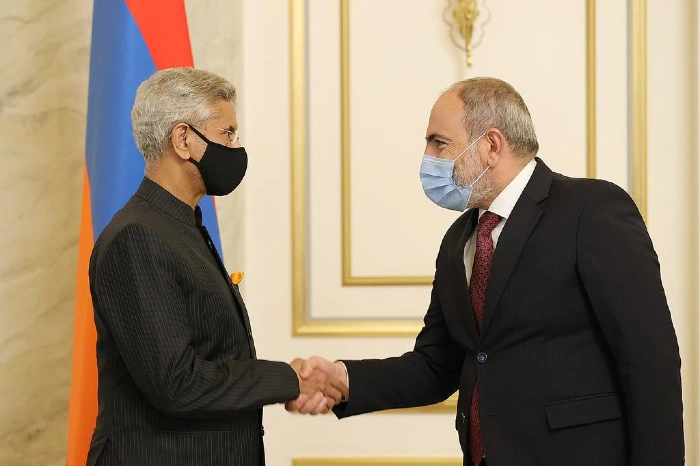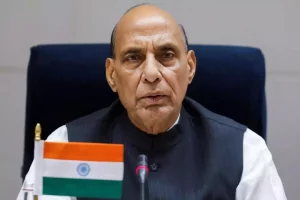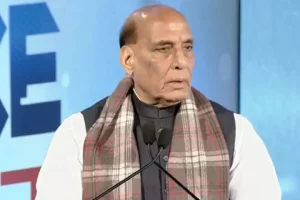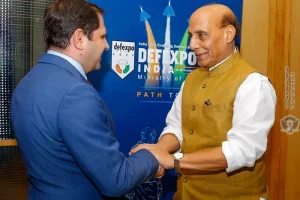A major highlight of the just concluded DefExpo 2022, India’s largest-ever defence exhibition, was the presence of a large Armenian delegation led by their country’s Defence Minister Suren Papikyan. The focus is on expanding bilateral military and military-technical cooperation between the South Caucasian country and India.
Armenia is a tiny speck on the world’s map, a country few Indians know about. And for India to expand significant defence cooperation with Armenia is a far-sighted policy undertaken by the current administration of Prime Minister Narendra Modi.
Why are ties with Armenia significant?
One, Armenia, situated in the south Caucuses range, sits at the heart of Eurasia, and its geostrategic importance can be gauged from the fact that it borders countries that are both friendly to India, like Russia, and Iran, and those inimical to her, like Turkey, and Azerbaijan. For India to gain a foothold in the region is of long-term benefit, important for power projection.
Second, for the first time India will be exporting the indigenously manufactured Pinaka rocket launchers to Armenia. Last month the two countries signed a deal for Rs 2,000 crore, which would include the Pinaka system, ammunition and anti-tank rockets. The system was developed by India’s Defence Research and Development Organisation (DRDO) and the order by Armenia is the first international order of its kind. Earlier, Armenia had procured four Swathi Weapon Locating Radars (WLRs) also developed by the DRDO at a cost of $40 million in 2020.
Defence minister of #Armenia Suren Papikyan visited the #DEFEXPO exhibition in Gandhinagar, India. pic.twitter.com/TmxVWmfGUV
— G219_Lost (@in20im) October 18, 2022
Such export of military hardware is meant to give a boost to the country’s defence industry and indigenous production. This is in keeping with the government’s “Atmanirbhar Bharat” and “Make in India” policies. The government has set an export target of $5 billion dollars of defence goods for 2025. As Defence Minister Rajnath Singh said at his inaugural speech at the DefExpo, India would become a defence manufacturing hub for the world in the next 25 years.
Thirdly, according to sources in Armenia, the visit of Papikyan is the beginning of a many more such high- level visits between the two countries as cooperation in defence is to be
further deepened. This, apart from procuring arms from India, also envisages setting up joint manufacturing bases in Armenia, something that India is set to do with Egypt. Armenia has a struggling economy but a large pool of specialists. At one time it was known as the Silicon Valley of the CIS. It can become a hub for defence exports further to countries in the region and the Balkans.
Fourth, Armenia-India ties go back centuries, evidence of which are scattered all across India at least. India enjoys a position in the mindscape of the country that few other nations do. This gives India an advantage there. At the same time Armenia is embroiled in a conflict with neighbouring Azerbaijan. While till recently the conflict centered around the disputed territory of Nagorno Karabakh, now taken over by Azerbaijan, the recent fighting has targeted Armenian territory within its internationally established borders.
Does this have any significance for India-Armenia defence ties? It indeed does, in a two-fold way.
First, Armenia is not just a friendly country embroiled in a conflict with a neighbour who is massively helped militarily by another country inimical to India – Turkey. But in recent years the Azerbaijan-Turkey partnership has expanded to include Pakistan. This again in itself may not have any bearing for India-Armenia ties. But not only has Turkey been stridently raking up the Kashmir issue in the UN General Assembly, it has been expanding defence partnership with Pakistan, and sheltering anti-India individuals and organizations.
At the same time Azerbaijan has injected itself into South Asian politics, by also taking up a pro-Pakistan position vis-à-vis Kashmir and spelling out its intent to support Pakistan in resolving the Kashmir issue. Azerbaijan is also negotiating with Pakistan for the procurement of Chinese-origin JF-17 fighters. This, therefore, only strengthens the case for a stronger India-Armenia partnership,
The other major reason for strong India-Armenia partnership, especially in defence, stems from the Azerbaijan intent in forming a corridor to Nakhichevan and thereon to Turkey through Armenian territory. Azerbaijan envisages the Zangazur corridor would connect it to the Azerbaijani exclave of Nakhichevan in western Armenia and onward to Turkey without Armenian border control over it. It cuts through Armenia’s southernmost province of Syuni which borders Iran’s Azeri province in the north. I have written in-depth about it in an earlier article here.
The corridor has major implications for India. It will effectively be out of Armenian control and would be controlled by Azerbaijan and Turkey, who can close the border with Iran with ease which would effectively cut off Iran from the Caucuses and the Black Sea routes to Europe. These are the multi-modal routes important for India’s backing of the International North South Transport Corridor. On the other hand, the corridor would give Turkey easy land access to Central and South Asia. Azerbaijan is intent on securing this corridor even by force, and the attacks on Armenian territory are in this direction.
India should do everything possible to prevent the forceful imposition of such a corridor, which takes on greater significance in the wake of the sanctions imposed on Russia. This would require a militarily strong Armenia, which, without being a threat to its neighbours, should be able to defend itself. With Armenia’s strongest defence ally Russia being distracted by Ukraine, India must do everything to help the tiny but strategically located country to protect itself.


















